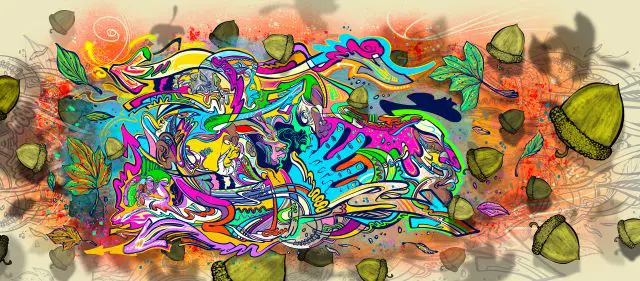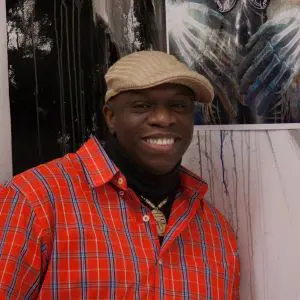Stacey Robinson

"To this day, I'm grateful the staff I worked with allowed me to use that camera and that Shane (Booth) taught my last class before graduating. Every time I teach an evening course, I think to myself I'm doing this for students like me who needed a professor like Shane."
Tell us about your background and your life growing up.
 I was born in Albany. My influences are science fiction, Black liberation politics, and comic book multimedia projection art. I moved to NYC the day Tupac Shakur died, and
the next day I became an intern at Milestone Media, a Black-owned comic
book company that has inspired many of today’s comic creators. Soon after I
interned at Black Enterprise magazine, and at Acclaim Comics. I moved to
Fayetteville, North Carolina, in 1998, where I attained my associate's degree and bachelor's degree while working professionally as a graphic designer. After receiving a full scholarship and the Arthur Schomburg Fellowship, I attended SUNY Buffalo, where I
received my MFA in 2015. I have two adult children who are my biggest joy to
parent, and I remarried my ex-wife.
I was born in Albany. My influences are science fiction, Black liberation politics, and comic book multimedia projection art. I moved to NYC the day Tupac Shakur died, and
the next day I became an intern at Milestone Media, a Black-owned comic
book company that has inspired many of today’s comic creators. Soon after I
interned at Black Enterprise magazine, and at Acclaim Comics. I moved to
Fayetteville, North Carolina, in 1998, where I attained my associate's degree and bachelor's degree while working professionally as a graphic designer. After receiving a full scholarship and the Arthur Schomburg Fellowship, I attended SUNY Buffalo, where I
received my MFA in 2015. I have two adult children who are my biggest joy to
parent, and I remarried my ex-wife.
What community college did you attend and why?
Fayetteville Technical Community College in Fayetteville, North Carolina. My major was graphic design and advertising. My fiancée was pregnant and told me that she wouldn’t marry a man without an education. It was the perfect opportunity to enter higher education again. I was living in NYC, interning for comic book companies and teaching art at the Boys & Girls Club of Harlem. Previously, I wasn’t mature enough to complete my college courses. My plan was that my diverse job experience and education would craft a unique art experience that would allow me to live my dream as an artist and educator while providing a future for my family.
Who were some individuals at your community college who helped shape your success and how did they do it?
Dave Sholter, Joyce Fuller, and Frank Galluccio were my primary design professors. My favorite story from those days is from a summer course I took. It was a typography course called CopyWriting, I believe. I was so frustrated that I had to take a type course. My argument was that I wanted to draw comics books — I didn’t need to know typography. I humbly learned so very much in that course. And some of the lessons Frank taught me I do with my students today. I know I tested his patience. I could see it in his face. I felt great coming back to visit his class after furthering my career.
Dave helped me realize how cool it would be to be a professor. He was patient and energetic and had the coolest Hollywood hair. I took great classes under him and learned about illustration and graphic design. I feel like Dave made learning effortless and fun, and I didn’t know how hard I was working.
Joyce was the chair of the program. One of my greatest community college lessons came via her drawing class. I remember I had to leave class 30 minutes after class started because I had to go to work. I would sneak out and often miss the bus. The bus system was horrible, and I needed this job as my son would be born that semester. I never communicated my needs to my professor, and as a result got a D in drawing. When I share this story people can’t believe I got a D in drawing. But one of the key lessons I always share with my students is to always communicate with your professor.
Shout-out also to Shane Booth, who officially taught me digital photography. He taught me one of my last classes, an evening course. And I was able to use a camera from work, a high-end Nikon D1. Super-expensive and amazingly powerful. To this day, I’m grateful the staff I worked with allowed me to use that camera and that Shane taught my last class before graduating. Every time I teach an evening course, I think to myself how I’m doing this for students like me who needed a professor like Shane.
How has attending a community college influenced your outlook on education and life?
I love recruiting. At times I consider leaving teaching for it. Then I remember my paycheck and research support. But I still recruit often and love talking with prospective students and especially their parents. I often recommend community college for students who aren’t ready either academically or socially for the four-year college experience. It can be overwhelming. Often students feel like community college is a lower and embarrassing experience, to which I reply, “Absolutely not.” I share with them that it was one of the greatest decisions I ever made. Community college was my educational foundation that taught me how to merge all my diverse interests. And because of that experience, I have a special place in my heart for these institutions. I even taught as an adjunct professor after graduate school for a year and thoroughly loved it. My students were hardworking and productive. Their rigor and drive were intense.
How do you view community colleges as being institutions that provide equitable opportunities for students who are pursuing a postsecondary education?
Community colleges are great entry points into post-high school and continuing education. As was said to me when I was adjunct teaching at the community college, “We are preparing them to transfer and finish their four-year degrees." I thought that was powerful because it brought me back to remembering what I needed in community college. I believe the cost of community college is more equitable and therefore accessible. Community colleges teach applicable trade skills that most four-year institutions don’t teach anymore. Thirty years ago, many of those skills were taught in high school. I don’t believe that four-year colleges and universities are for everyone. And they aren’t designed to be equitable. They are designed, in part, to reinforce divisions in social class. Community college does so much more to lessen that social divide than many DEI efforts.
Tell us something fun about yourself.
I DJ locally as part of a multimedia art quintet called Darker Than Blue. We collaborate with other multimedia sound, projection, artists, and gallery curators to craft inclusive experiences. Champaign-Urbana is the best art community I’ve ever been a part of. Many people here helped me become the artist I am aspiring to be and embraced me in ways I was reluctant to dive into.
Is there anything else you'd like to add?
I can’t imagine where my knowledge set would be if not for community college. My design career is founded on my education from Fayetteville Technical Community College. I heavily reference that education today, teach from it, and share stories from that experience. I encourage everyone to know more about what courses are offered at your local community college. Contact me on my website.
Digital drawing at top, "Parable Path," by Stacey Robinson, 2021.


